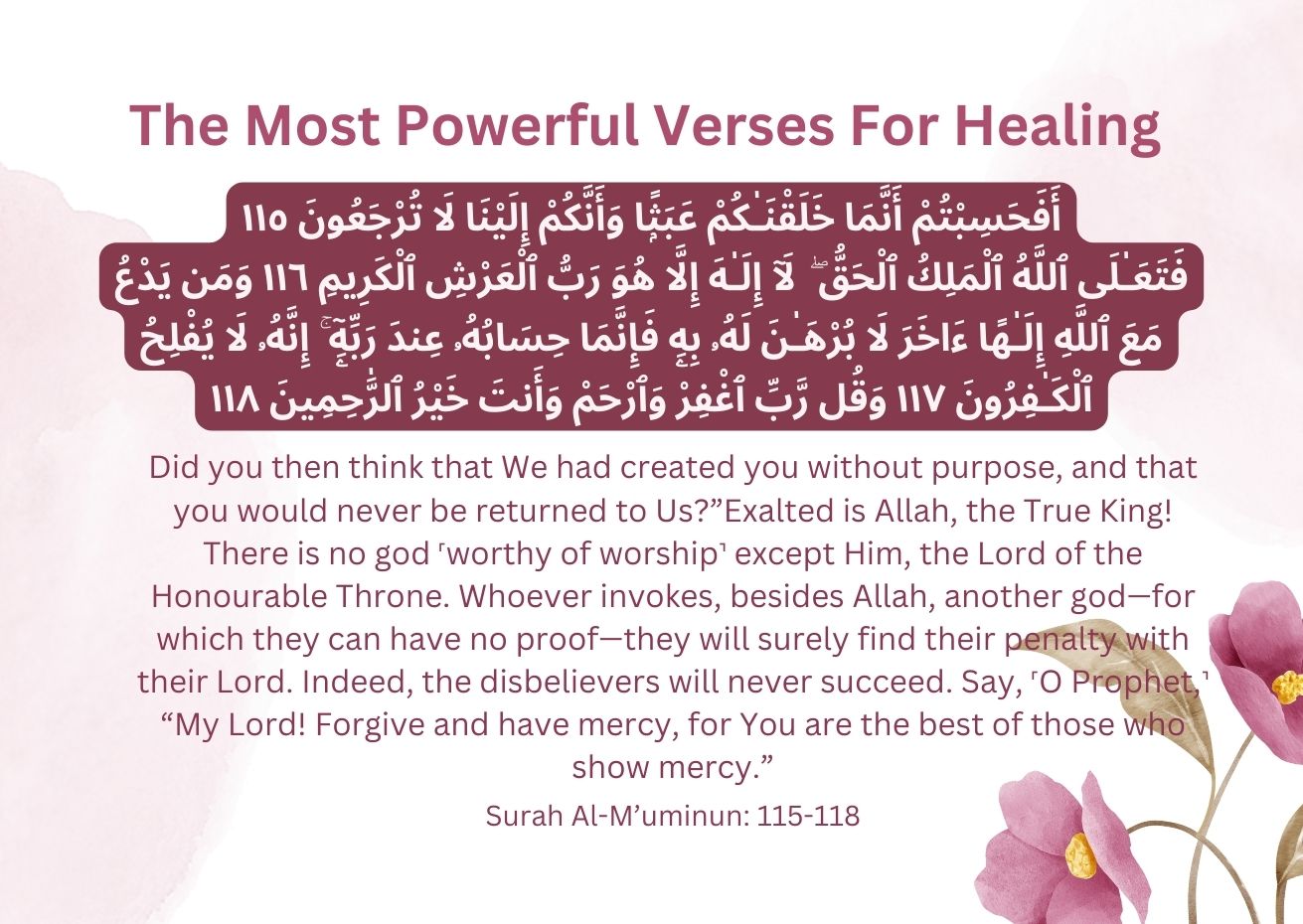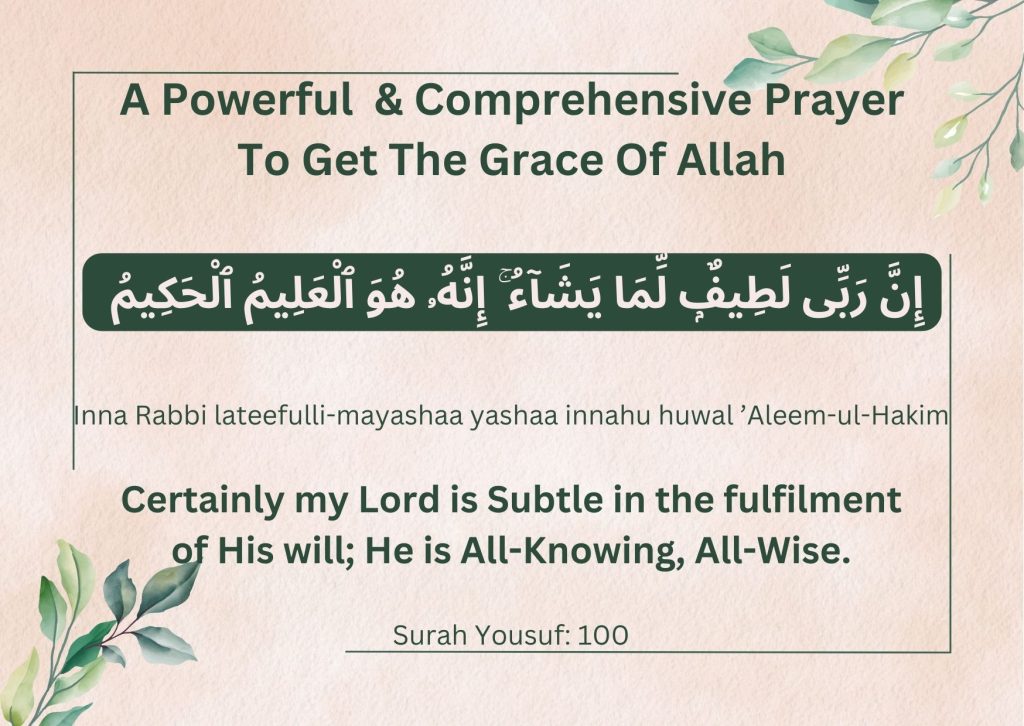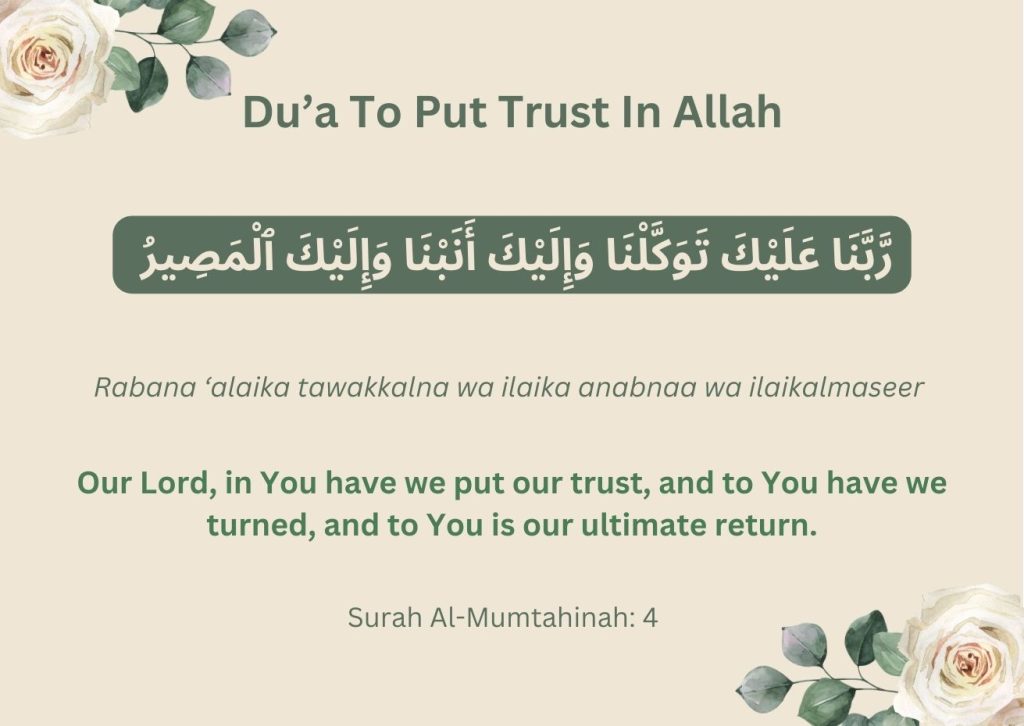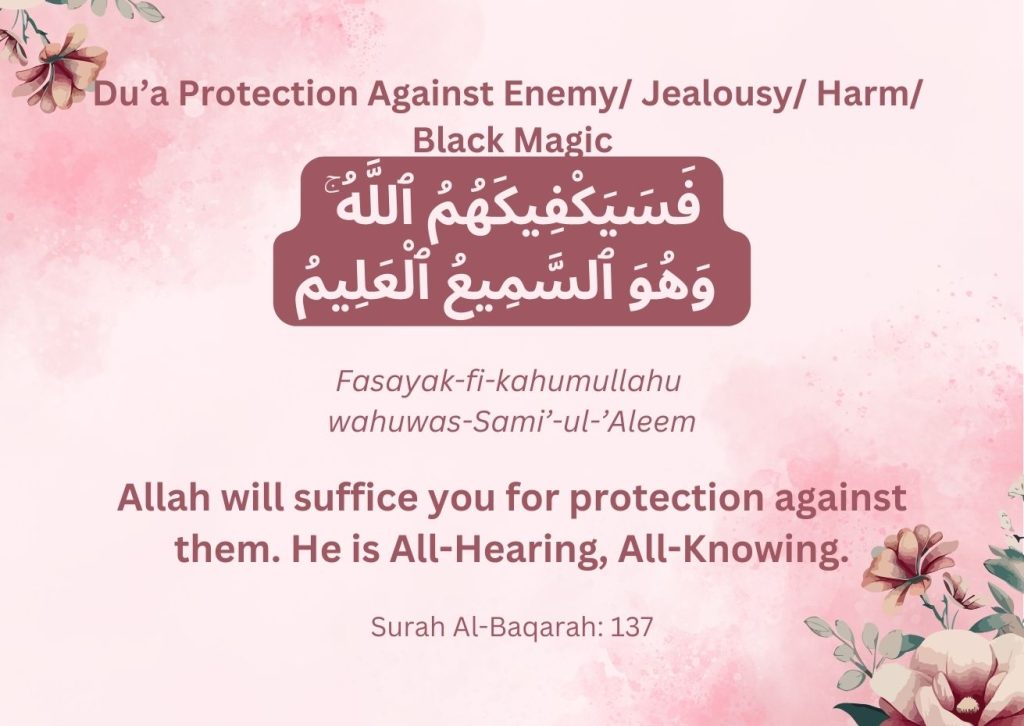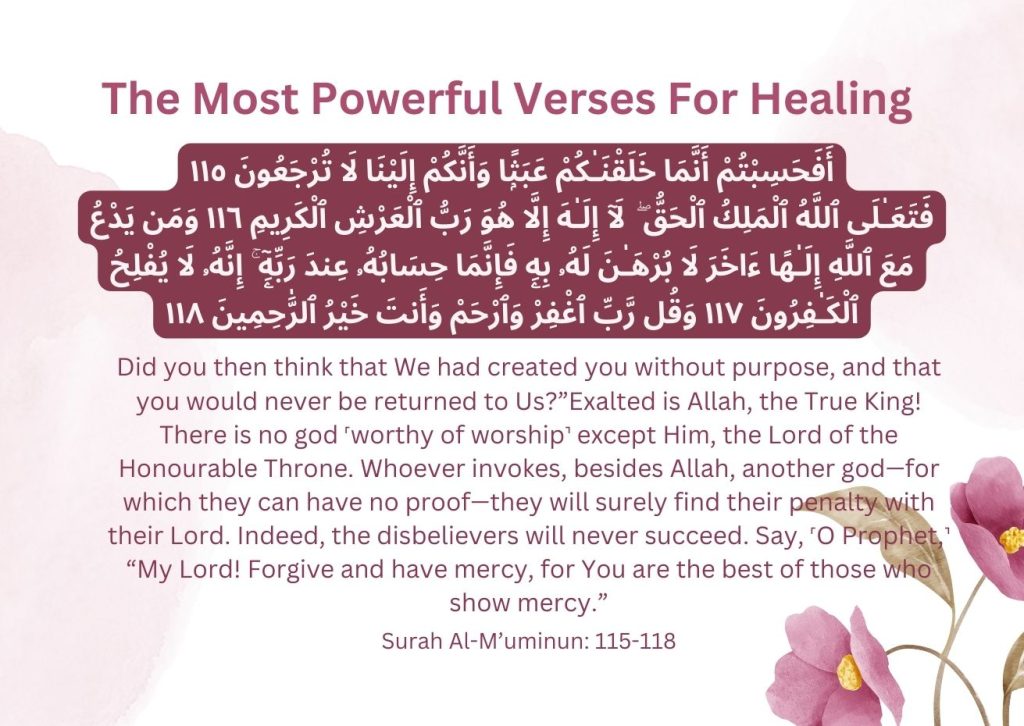
Introduction of prayer:
The last four verses of Surah Al-Mu’minun contain amazing healing power against all diseases. You can cure any health-related issues and life-threatening diseases by rehearsing this Surah. Some diseases you can cure through these verses include cancer, heart problems, diabetes, and others.
Reciting these verses is also greatly beneficial for achieving the hard tasks. The Holy Prophet (pbuh) described the virtues of these verses in a Hadith;
Sayyiduna ‘Abdullah ibn Mas’ud (radiyallahu ‘anhu) recited some Verses in the ear of a person [who was unconscious] as he was affected by some ailment. This person regained consciousness. Rasulullah (sallallahu ‘alayhi wa sallam) asked him, ‘What did you recite in his ear?’ He replied, ‘I recited the Verses ‘Did you think that we had created you without any purpose…'(Surah Al Mu’minun Verse: 115-118) till the end of the Surah.’ Rasulullah (sallallahu ‘alayhi wa sallam) said, ‘If a person recites this with conviction on a mountain, it would move.’”( Al Adhkar: 394, Majma’uz Zawaid, vol. 5 pg. 115, Lisanul Mizan, vol. 4 pg. 98 and Tanzihush Shari’ah, vol. 1 pg. 294)
Exposition & virtues of prayer;
1- أَفَحَسِبْتُمْ أَنَّمَا خَلَقْنَـٰكُمْ عَبَثًۭا وَأَنَّكُمْ إِلَيْنَا لَا تُرْجَعُونَ
Did you then think that We had created you without purpose, and that you would never be returned to Us?”
Allah Kareem asks mankind in this verse did you think that you were created in vain, with no purpose, with nothing required of you and no wisdom on Our part. Indeed Allah Almighty created the universe with a great plan of wisdom. He the Exalted created man for His worship and to obey His commands.
Allah Kareem says in Surah Ali ‘Imran, verse: 190-191;
إِنَّ فِى خَلْقِ ٱلسَّمَـٰوَٰتِ وَٱلْأَرْضِ وَٱخْتِلَـٰفِ ٱلَّيْلِ وَٱلنَّهَارِ لَـَٔايَـٰتٍۢ لِّأُو۟لِى ٱلْأَلْبَـٰبِ ١٩٠ ٱلَّذِينَ يَذْكُرُونَ ٱللَّهَ قِيَـٰمًۭا وَقُعُودًۭا وَعَلَىٰ جُنُوبِهِمْ وَيَتَفَكَّرُونَ فِى خَلْقِ ٱلسَّمَـٰوَٰتِ وَٱلْأَرْضِ رَبَّنَا مَا خَلَقْتَ هَـٰذَا بَـٰطِلًۭا سُبْحَـٰنَكَ فَقِنَا عَذَابَ ٱلنَّارِ ١٩١
Indeed, in the creation of the heavens and the earth and the alternation of the day and night there are signs for people of reason. ˹They are˺ those who remember Allah while standing, sitting, and lying on their sides, and reflect on the creation of the heavens and the earth ˹and pray˺, “Our Lord! You have not created ˹all of˺ this without purpose. Glory be to You! Protect us from the torment of the Fire.
2- فَتَعَـٰلَى ٱللَّهُ ٱلْمَلِكُ ٱلْحَقُّ ۖ لَآ إِلَـٰهَ إِلَّا هُوَ رَبُّ ٱلْعَرْشِ ٱلْكَرِيمِ ١١٦
Exalted is Allah, the True King! There is no god ˹worthy of worship˺ except Him, the Lord of the Honourable Throne.
Allah Kareem glorified His Self and His attributes in this great verse. He called Him as;
فَتَعَـٰلَى ٱللَّهُ : The Exalted and High, The One who is High in all respects
From the root word ع ل و there are three Beautiful Names of Allah Kareem; Al-Aliyy (The High), Al-Ala, (The Most High) and Muta-Ali (The High above).
ٱلْمَلِكُ ٱلْحَقُّ ۖ: (The True King)
This means: He is the True King, Who is Himself the Truth and His promise is true. Likewise, His threat is true, His Messengers are true, the Paradise is true, the Hellfire is true and everything from Him is true.
Al-Malik is the king, whose limits are not confined to a boundary, He is ever-lasting in time and space. He can never be disowned from His throne and doesn’t need the support of His subjects. He does not need His kingdom, His kingdom needs Him. He rules by Himself; He does not need any help to rule.
لَآ إِلَـٰهَ إِلَّا هُوَ (There is no god worthy of worship except Him)
This blessed phrase is called Tahlil in Islamic Terminology. It contains a lot of virtues and benefits. When uttered sincerely, it leaves the realms of this earth and ascends to the Magnificent Throne of Allah. It is the guarantor of one’s ultimate success: its utterer will be saved from Hell and will be guaranteed Paradise and the intercession of the Prophet (pbuh).
The Holy Prophet (pbuh) used to supplicate with Tahlil after every obligatory Salah and in the morning and evening Adhkar.
رَسُولَ اللَّهِ صلى الله عليه وسلم كَانَ يَقُولُ فِي دُبُرِ كُلِّ صَلاَةٍ إِذَا سَلَّمَ “ لاَ إِلَهَ إِلاَّ اللَّهُ، وَحْدَهُ لاَ شَرِيكَ لَهُ، لَهُ الْمُلْكُ، وَلَهُ الْحَمْدُ، وَهْوَ عَلَى كُلِّ شَىْءٍ قَدِيرٌ
Narrated Warrad:
(the freed slave of Al-Mughira bin Shu`ba) Al-Mughira wrote to Muawiya bin Abu Sufyan that Allah’s Messenger (ﷺ) used to say at the end of every prayer after the Taslim, “La ilaha illa-l-lahu wahdahu la sharika lahu; lahu-l-mulk wa lahu-l-hamd, wahuwa ‘ala kulli shai’n qadir. Allahumma la mani’a Lima a taita, wa la mu’ta Lima mana’ta, wa la yanfa’u dhal-jaddu minkal-jadd. (Bukhari: 6330)
He (pbuh) used to invoke Allah Kareem by saying;
“ لاَ إِلَهَ إِلاَّ اللَّهُ الْعَظِيمُ الْحَلِيمُ، لاَ إِلَهَ إِلاَّ اللَّهُ رَبُّ السَّمَوَاتِ وَالأَرْضِ، رَبُّ الْعَرْشِ الْعَظِيمِ ”.
رَبُّ ٱلْعَرْشِ ٱلْكَرِيمِ: The Lord of the Honourable Throne
The noun ARSH (عَرْش) occurs 29 times in the Holy Quran. Arsh means the Honourable Throne of the Lord. However, the Arsh of Allah has no similarity with the thrones of His creatures. His Arsh is the greatest creation. It is unique, none knows the essence, nature, and substance.
إِنَّ رَبَّكُمُ ٱللَّهُ ٱلَّذِى خَلَقَ ٱلسَّمَـٰوَٰتِ وَٱلْأَرْضَ فِى سِتَّةِ أَيَّامٍۢ ثُمَّ ٱسْتَوَىٰ عَلَى ٱلْعَرْشِ
Indeed your Lord is Allah Who created the heavens and the earth in six Days, then established Himself on the Throne. (7: 54)
The Holy Prophet (pbuh) used to call upon Allah in times of distress by invoking Tahlil and the title of the Almighty ‘The lord of the Honourable Throne;
كَانَ النَّبِيُّ صلى الله عليه وسلم يَدْعُو عِنْدَ الْكَرْبِ “ لاَ إِلَهَ إِلاَّ اللَّهُ الْعَظِيمُ الْحَلِيمُ، لاَ إِلَهَ إِلاَّ اللَّهُ رَبُّ السَّمَوَاتِ وَالأَرْضِ، رَبُّ الْعَرْشِ الْعَظِيمِ ”.
Narrated Ibn `Abbas:
The Prophet (ﷺ) used to invoke Allah at the time of distress, saying, “La ilaha illal-lahu Al-`Azim, al- Halim, La ilaha illal-lahu Rabbu-s-samawati wal-ard wa Rabbu-l-arsh il-azim.”(Bukhari: 6345)
3- وَمَن يَدْعُ مَعَ ٱللَّهِ إِلَـٰهًا ءَاخَرَ لَا بُرْهَـٰنَ لَهُۥ بِهِۦ فَإِنَّمَا حِسَابُهُۥ عِندَ رَبِّهِۦٓ ۚ إِنَّهُۥ لَا يُفْلِحُ ٱلْكَـٰفِرُونَ ١١٧
Whoever invokes, besides Allah, another god—for which they can have no proof—they will surely find their penalty with their Lord. Indeed, the disbelievers will never succeed.
Shirk is the worst form of wrong. Allah Kareem declares in the Qur’an that He will never pardon the practitioner of shirk. Allah threatens those who worship Allah associating others with Him in worship. And whoever invokes, besides Allah, any other god, of whom he has no proof Allah will call him to account for that. Then Allah states that the disbelievers will not be successful on the Day of Judgement. They will not be saved from the torment of Hellfire.
4- وَقُل رَّبِّ ٱغْفِرْ وَٱرْحَمْ وَأَنتَ خَيْرُ ٱلرَّٰحِمِينَ ١١٨
Say, ˹O Prophet,˺ “My Lord! Forgive and have mercy, for You are the best of those who show mercy.”
In the last verse of the Surah, Allah Kareem taught a beautiful prayer asking for forgiveness and mercy. Istighfar means to seek forgiveness and pardon for sins and mistakes. This is considered a great action of worship in Islam. Allah Kareem commands the believers to seek the forgiveness and mercy of Allah.
Ar-Raheem: is mentioned 72 times with Al-Ghafūr, one of the most common sets of pairs of Allah’s names.
يَعْلَمُ مَا يَلِجُ فِى ٱلْأَرْضِ وَمَا يَخْرُجُ مِنْهَا وَمَا يَنزِلُ مِنَ ٱلسَّمَآءِ وَمَا يَعْرُجُ فِيهَا ۚ وَهُوَ ٱلرَّحِيمُ ٱلْغَفُورُ ٢
He knows whatever goes into the earth and whatever comes out of it, and whatever descends from the sky and whatever ascends into it. And He is the Most Merciful, All-Forgiving.
He is Most Merciful to His servants; He does not hasten to punish them, and He forgives the sins of those who repent to Him and put their trust in Him.
The Holy Prophet Muhammad (pbuh) stated the virtues of seeking forgiveness in this Hadith;
Narrated Abu Huraira:
I heard the Prophet (ﷺ) saying, “If somebody commits a sin and then says, ‘O my Lord! I have sinned, please forgive me!’ and his Lord says, ‘My slave has known that he has a Lord who forgives sins and punishes for it, I therefore have forgiven my slave (his sins).’ Then he remains without committing any sin for a while and then again commits another sin and says, ‘O my Lord, I have committed another sin, please forgive me,’ and Allah says, ‘My slave has known that he has a Lord who forgives sins and punishes for it, I therefore have forgiven my slave (his sin). Then he remains without Committing any another sin for a while and then commits another sin (for the third time) and says, ‘O my Lord, I have committed another sin, please forgive me,’ and Allah says, ‘My slave has known that he has a Lord Who forgives sins and punishes for it I therefore have forgiven My slave (his sin), he can do whatever he likes.”(Bukhari: 7507)
He (pbuh) taught many prayers to ask forgiveness and mercy of Allah;
“ اللَّهُمَّ اغْفِرْ لِي وَارْحَمْنِي وَاهْدِنِي وَارْزُقْنِي ” .
” O Allah, grant me pardon, have mercy upon me, direct me to the path of righteousness and provide me sustenance.”(Sahih Muslim: 2697a)
How to recite?
- Recite Salawat upon Sayyidna Muhammad (pbuh) three times
- Recite these verses three times in the ear of the patient, but if not possible doing so, can be recited from distance
- Recite Salawat upon Sayyidna Muhammad (pbuh)
- Blow it on the Patient
- These verses can be recited for gaining a hard task
